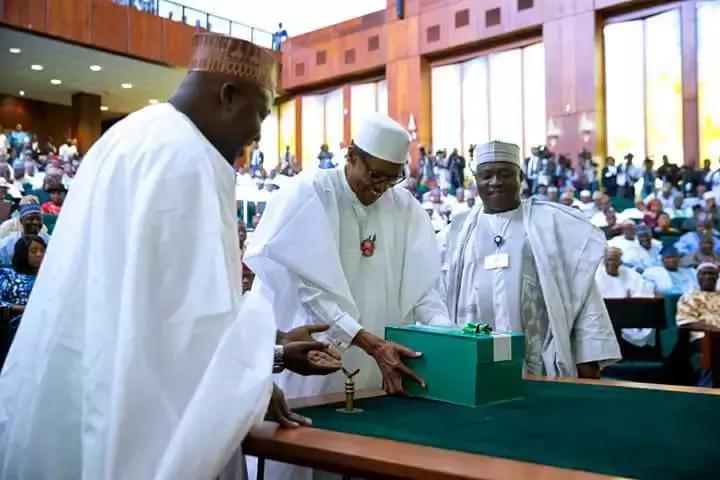The Federal Government’s 2018 Appropriation Act that became operational Wednesday has on one hand drawn the flak of some Nigerians for being a one-sided document and on the other hand, gotten accolades.
Though Bukola Saraki, the Senate President and Yakubu Dogara, Speaker of the House of Representatives were conspicuously absent at the signing ceremony in Aso Rock, President Muhammadu Buhari after assenting the Bill into law accused members of the National Assembly of budget ‘padding.’
Before the passage of the budget by the National Assembly into law on May 16, this year, Abdulmumin Jibrin, the immediate past Chairman of Appropriation Committee in the House of Representatives was suspended in 2017 for a period of 180 legislative days for ‘unfolding’ budget padding scandal in the legislature.
While many Nigerians are angry with members of National Assembly for slashing the budget sent to them by President Buhari and inserting their constituency projects into it, others say “There is no budget balancing in Nigeria,” yet few thanked the President for signing it.
From different the privately owned radio stations in Uyo- Comfort FM, Inspiration Radio to Planet 101.1 FM, the analysts, Wednesday, were in unanimous in condemning the budget ‘padding’ by the National Assembly and refocusing the budget on recurrent instead of capital projects.
Analysts in Comfort FM, Uyo observed “There is no harmony between the Federal Government and the National Assembly. They are working at cross purposes- not working together. It is a paradox that members of the same political party are working differently.”
One analyst stated “If I were the President, I would not have signed the budget into law because of the way it tampered with by the legislators. But then if he did not sign, there would have been a shutdown of government after six months and government would not have worked again. But then, I applaud the president for signing the bill rather than delaying it that would have had adverse effects on many sectors in government.”
“Let us look at the budget, how much is allocated to education and the economy? I do not think the National Assembly should have slashed allocations to these sectors and added to other sectors under recurrent expenditure. These are important sectors that touch the lives of Nigerians and not just individuals.”
An analyst in Inspiration Radio, Uyo noted “The budget as it stands is not a good omen. The National Assemblymen cut down expenditures on vital sub-heads but added them to constitutency projects which their local and state governments could have handled.
“They cut down about 4,000 projects of the executive arm of government and increased theirs to 6,403 constituency projects. Why did they slash money allocated to renovation and building of schools in the country?”
However, some analysts in Comfort FM, Uyo expressed fears on the implementation of the budget. Their fears are based on the fact that previous budgets were not usually implemented to the letter.
“Justice and equity are not usually entrenched in the budget implementation. It shows the budget implementation is one-sided. This is my biggest problem. In 2016, the Federal Government implemented 25 per cent. In 2017, the government implemented 30 per cent. Why do we talk about budget every year when it not properly and fully implemented to better the lots of the people?
A caller from Planet 101.1 FM, Uyo, queried “How did government implement budgets of previous years? Who is monitoring the budget implementation at the federal level? If the money budgeted was not spent in a year, what happened to it? Is the budget carried forward or accounted for?
Some analysts in Comfort FM also feared that though the bill has been signed into law, does it mean the budget will reflect on the lives of the common people in this country?
“My concern is that National Assembly has increased its budget, yet sensitive areas that would have touched the lives of the common people were cut down. It means that Recurrent Expenditure overrides Capital Expenditure. This does not make for progress. Any government that wants to make progress must give greater allocations to capital not recurrent projects.”
Other analysts observed “There is no budget balancing in Nigeria. It is not enough to cut down expenses on some projects, raise others that will make for good budgeting. Take a holistic approach on budgeting and allocate to the areas or states to reflect and assuage the various interests and persons in all the geo-political regions in the country.
“Let us encourage ethnic balancing in the yearly budgeting. Let the government do away with envelop budgeting. Let the government involve consultants in the preparation of budget instead of always giving to ministries and departments that may ignore interests of the less privileged people but in turn feather their own interests.”

